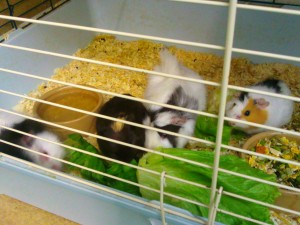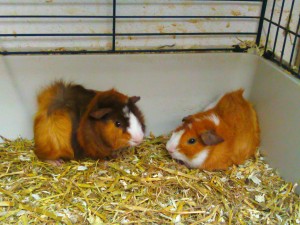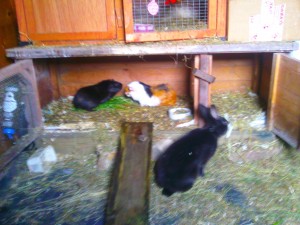Guinea Pig Cages – Are They Better Than Guinea Pig Hutches?
 For many years now there has been an ongoing dispute about what type of house you should keep your guinea pig in: A modern cage verses the sturdy hutch.
For many years now there has been an ongoing dispute about what type of house you should keep your guinea pig in: A modern cage verses the sturdy hutch.
Many people often associate hutches with bigger animals such as rabbits but guinea pigs can live in them too! Another common misconception is that a guinea pig will only need a small hutch, not a rabbit-sized hutch – this is not true! Guinea pigs should have the same amount of room that you’d give to rabbits, especially as the hutch is likely to need to accommodate more than one piggy as you should always keep guinea pigs in pairs or small groups. But don’t go to excess with size; guinea pigs have fairly poor eyesight and cannot see clearly further than a metre, for this reason don’t get a huge hutch, as your pet may be scared that there’s another animal lurking in its home. Many owners also choose to situate the hutch in a shed or outbuilding for extra security. For more on hutches, see Choosing Guinea Pig Hutches.
The question is are guinea pig cages better than hutches? A lot of owners seem to think so. Guinea pigs are small animals that can get cold quite easily so surely it would be best to keep them in a cage that can go inside your house?
Many guinea pigs are kept indoors for many reasons: the owners don’t have a garden; there are too many predators around outside; they live in a cold environment; or the owners prefer to have their pets near them – the list of reasons really is endless.
There are many advantages of keeping a guinea pig in a cage, as well as disadvantages. First lets look at the advantages:
• If you live somewhere with limited outside space you don’t have to find extra space to put a large hutch.
• The cage can easily be moved to a warmer or colder environment should need be.
• Many owners believe cages are easier to clean out than hutches as you have more ‘access’ to them.
• If your guinea pig has long hair or is a show guinea pig a cage may keep him or her cleaner (although this depends on how often the cage is cleaned out).
• You can keep a closer eye on your cavy if its cage is in your home, rather than having to go outside.
And now the disadvantages to keeping a guinea pig in a cage:
• The guinea pigs are constantly on display and may not be able to get enough privacy as they want.
• Many cages for guinea pigs are actually too small, including a lot of the cages pet shops sell, so many guinea pigs don’t have the room they need.
• Guinea pigs may try to chew the plastic which the cage is likely to be made of which could be harmful.
• If the cage has a wire floor your guinea pig could easily catch his/her foot and potentially break a bone which could be fatal.
• Some cages have plastic or glass walls – this is bad as it can cause a temperature rise in warm environments which could cause the guinea pig to overheat. Another problem with plastic/glass walls is that there could be limited ventilation getting into the cage.
 There are also many different types of cages; the main two types which I have come across are the standard cage (similar to a hamster cage) and the ‘C&C cages’.
There are also many different types of cages; the main two types which I have come across are the standard cage (similar to a hamster cage) and the ‘C&C cages’.
C&C cages (Cubes and Coroplast cages) are often a cheaper alternative to the standard cage. C&C cages mainly consist of a ‘room’ made of a plastic base with either plastic or wire mesh walls, joining onto another similar room. These cages tend to be ‘open planned’ with no roof and can have ‘rooms’ added to them and the floor plan changed easily. These cages are very good as there is not usually a size limit as more space can be added. A second storey can often be created to give the guinea pig more space and a more complex home to explore.
If you choose to get a guinea pig and keep it in a cage I recommend a C&C cage as these are generally bigger than pet-shop cages (and can often be made bigger) and ultimately will give your pet a nicer home – animal welfare is important!
As a general rule, whether you get a hutch or a cage, the total length of the hutch or cage should be at least 4 or 5 times the length of a fully grown guinea pig who is stretched out. The minimum width should be that of the length of the guinea pig, again when he or she is stretched out. However if you house more than one guinea pig in the same hutch/cage, the guinea pigs’ home will have to be bigger.
 An ideal size for a hutch or cage for two guinea pigs is 120 x 60 x 45cm.
An ideal size for a hutch or cage for two guinea pigs is 120 x 60 x 45cm.
Aside from the hutch or cage, your guinea pig will also need an exercise run or somewhere they can take regular exercise. In the wild guinea pigs are running about a lot so exercise is important.
So, are cages better than hutches? The answer will vary depending on a number of factors. If you have a garden, a hutch would probably be best, provided you have a suitable place to put it, ideally in a shed or outbuilding. If you live in flat, then a cage is probably going to be best option – after all you don’t want a hutch taking up your spare room.
Any questions? Comment below and we’ll answer as soon as possible.
 October 29, 2010
·
October 29, 2010
·  Maddia (Admin) ·
Maddia (Admin) ·  Comments Closed
Comments Closed
 Tags: C&C cages, guinea pig cages, guinea pig homes, guinea pig hutches, guinea pigs · Posted in: Guinea Pig Care, Guinea Pig Information
Tags: C&C cages, guinea pig cages, guinea pig homes, guinea pig hutches, guinea pigs · Posted in: Guinea Pig Care, Guinea Pig Information


